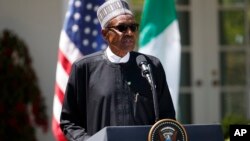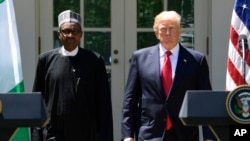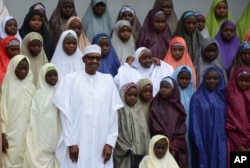Nigerian President Muhammadu Buhari says life in the country's northeast is improving, as the threat of Boko Haram militants recedes and people return to their homes and farms.
In an interview late Monday with VOA, Buhari said many Nigerians who fled the northeast at the height of the Boko Haram insurgency have gone back home and are cultivating their farms with the help of low-interest loans from the government.
"People who went to the farm did not regret it," he said. "We found that farming is a way out, and we are really happy."
Buhari said that when he took office in 2015, the Islamist militants controlled a majority of local government areas in Borno state. "But now they are not holding any local governments, according to what the military told me, and I believe them," he said Monday.
Boko Haram remains active in northeastern Nigeria and neighboring Cameroon but has been severely weakened by a multi-national task force that includes Nigeria and four of its neighbors.
Buhari sat down for an interview a few hours after meeting with U.S. President Donald Trump at the White House. He was the first sub-Saharan African leader to have a White House summit with Trump, who has been criticized for reportedly making derogatory comments about Africa.
Buhari said the talks focused on security, the Nigerian economy, and efforts to combat Nigeria's endemic corruption. "He wanted to hear from me, what progress did you make on this?" Buhari said.
Joint press conference
During his public remarks with Buhari, Trump focused mostly on common goals and shared interests, such as fighting terrorism and expanding trade.
“We love helicopters — he loves them more than I do,” joked Trump, referring to his administration’s decision to approve a $600 million military sales deal to Nigeria.
Buhari thanked Trump for approving the deal, which the administration of former President Barack Obama had suspended over allegations of human rights abuses.
Human rights groups have accused the Nigerian military of torture, rape and extrajudicial killing in its almost decade-long campaign against Boko Haram.
Tens of thousands of people have been killed in the insurgency, and hundreds of school girls kidnapped, as the group gained notoriety and spread to neighboring countries, posing one of the most severe threats to West Africa’s Sahel region in recent years.
Relationship challenges
Although Nigeria has been a major partner in the U.S. fight against Islamist extremists in Africa, relations have faced challenges over the past year.
In January, Nigeria joined a list of outraged African countries demanding an explanation from the U.S. ambassador after Trump’s reported vulgar comments referring to African countries.
Asked whether those comments came up during his private meeting with Trump, Buhari declined to comment.
“I’m very careful with what the press says about other than myself. I’m not sure about, you know, the validity or whether that allegation was true or not. So, the best thing for me is to keep quiet,” Buhari said.
Expanded trade?
Nigeria, Africa’s most populous country with 186 million people, has a quickly growing economy. Buhari’s trip is meant in part to secure more U.S. investment.
Trump said the U.S. “hopes to be the economic partner of choice for nations across the continent.”
That comment was presumably aimed at China, which is currently the top investor in Nigeria.
But the U.S. leader stressed he wants the U.S.-Nigeria relationship to be based “on the principle of fairness and reciprocity.”
“We give Nigeria well over $1 billion in aid every year, and we have already started talking to the president about taking down… the very substantial trade barriers,” Trump said.
“We think we are owed that,” he added.








Facebook Forum